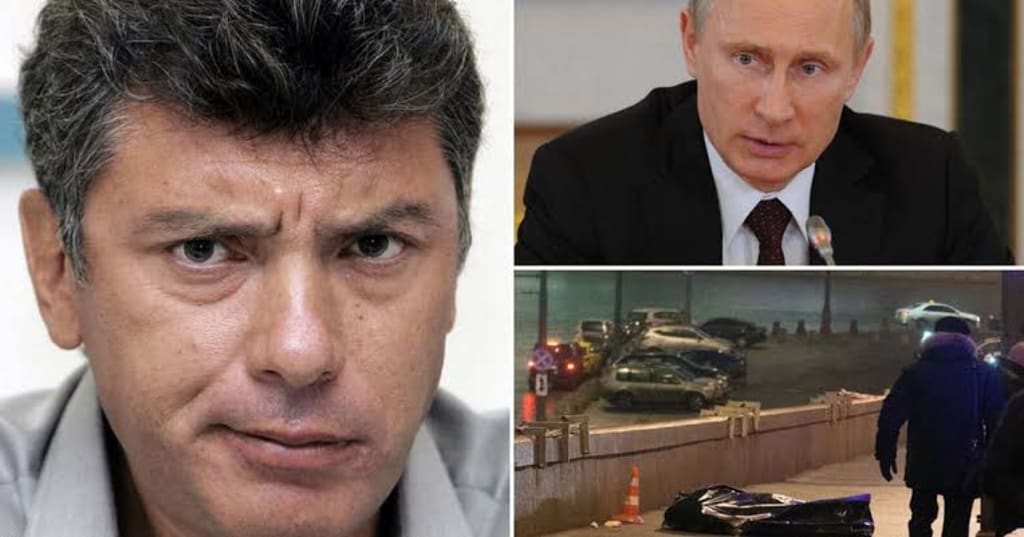Assassination of Russian Activist"
Boris Nemtsov, a prominent Russian opposition politician, was assassinated in 2015 for his vocal criticism of President Putin's administration and his advocacy of democracy.

Boris Nemtsov, a prominent Russian opposition politician, gained international recognition for his advocacy of democracy, human rights, and political reform in Russia. Born on October 9, 1959, in Sochi, Russia, Nemtsov's political career began in the 1990s when he rose to prominence as a young reformist leader. He held various government positions, including serving as the governor of Nizhny Novgorod Oblast and later as a deputy prime minister under President Boris Yeltsin.
Nemtsov was a vocal critic of President Vladimir Putin's policies and the increasing centralization of power in Russia. He co-founded several political parties, including the Union of Right Forces, which aimed to promote liberal and democratic values. However, Nemtsov's criticism of Putin's administration and his accusations of corruption within the government made him a controversial figure in Russian politics.
The culmination of Nemtsov's political activism was his opposition to Russia's involvement in the Ukraine conflict in 2014. He was a fervent supporter of Ukraine's territorial integrity and condemned Russia's annexation of Crimea. Nemtsov's outspoken stance against the government's actions in Ukraine led to increased tensions between him and the Russian authorities.
Tragically, on February 27, 2015, Boris Nemtsov was assassinated in Moscow, just a stone's throw away from the Kremlin. He was shot four times in the back while walking on Bolshoy Moskvoretsky Bridge with his Ukrainian girlfriend, Anna Duritskaya. The murder sent shockwaves through Russia and the international community, sparking outrage and raising concerns about the safety of opposition figures within the country.
The circumstances surrounding Nemtsov's assassination remain controversial and have been subject to multiple investigations and speculations. Five individuals, all of whom were Chechen nationals, were eventually arrested and tried for their involvement in the murder. The trial took place behind closed doors, and many critics raised doubts about the transparency and fairness of the proceedings.
Nemtsov's death served as a grim reminder of the challenges faced by those who dared to criticize the Russian government. It highlighted the risks associated with being an outspoken critic of the regime and underscored the shrinking space for political dissent in the country. In the aftermath of his assassination, memorial marches and gatherings were organized in his honor, both in Russia and abroad, with participants demanding justice for his murder and an end to political repression.
Boris Nemtsov's legacy continues to resonate in the ongoing struggle for democratic freedoms and human rights in Russia. He is remembered as a courageous politician who refused to be silenced by threats and intimidation, even in the face of grave personal danger. His commitment to transparency, accountability, and open dialogue left a lasting impact on Russia's political landscape.
However, his death also highlighted the fragility of independent voices in a climate of political repression. Many opposition figures have since faced increased scrutiny, harassment, and legal challenges, making it difficult to openly express dissenting opinions. International organizations and governments have condemned Nemtsov's assassination and called for a thorough and impartial investigation, expressing concern about the state of political freedom in Russia.
In the years following Nemtsov's murder, his memory has been kept alive through various means, including documentaries, books, and public commemorations. The Boris Nemtsov Foundation for Freedom was established to continue his work in advocating for democratic values and human rights. Despite the challenges, his legacy remains a source of inspiration for those who continue to strive for a more open and democratic Russia.
In conclusion, Boris Nemtsov's assassination in 2015 marked a tragic moment in Russian political history. His outspoken criticism of the government, dedication to democracy, and his untimely death serve as a powerful reminder of the complexities and risks faced by those who stand up against authority. While his physical presence may have been silenced, his legacy continues to inspire those who seek positive change in Russia's political landscape.
About the Creator
Enjoyed the story? Support the Creator.
Subscribe for free to receive all their stories in your feed. You could also pledge your support or give them a one-off tip, letting them know you appreciate their work.





Comments
There are no comments for this story
Be the first to respond and start the conversation.